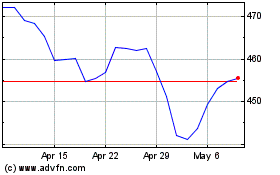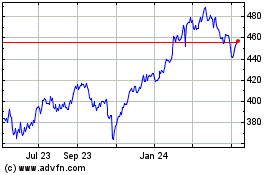Credit and Debit Cards May Be Adding a New Element: Fingerprints
June 19 2018 - 10:49PM
Dow Jones News
By AnnaMaria Andriotis
Everyone knows the future of payments is digital. Trouble is,
Americans just don't want to give up plastic.
Tech companies, banks and fintech startups have all tried to
wean consumers off physical cards. Attempts have included digital
wallets and various apps. So far, though, these efforts seem to be
solutions in search of a problem, as people still find plastic
cards incredibly easy to use.
So, card companies are now considering steps that would try to
bolster the security of plastic through the use of
fingerprint-enabled cards. Visa Inc. and Mastercard Inc. are in the
early stages of adding fingerprint sensors to cards, a move they
believe will help lower fraudulent purchases in stores.
Prints match
Here's how it works. When consumers activate their cards, they
place a finger on a fingerprint sensor on the card. A template of
the print is then stored on the card's chip, which is usually
located above the card number. When cardholders use the card to pay
at a store's checkout terminal, technology in the card's chip
checks the print to make sure it matches the print stored on the
card.
The move is the latest in a string of security features that
card networks have rolled out to lessen fraud. Proponents of the
technology say that if swindlers steal or replicate the fingerprint
card, the purchases they try to make in store won't be approved
because their fingerprint won't match the template. They say the
cards can also improve consumer convenience, including lessening
the chances of consumers' legitimate in-store card transactions
being flagged as fraudulent and getting rejected.
Card analysts say that banks' appetite for these cards is
limited, however, in large part because of the hefty costs they
incurred reissuing U.S. consumers' debit and credit cards with
security chips over the past few years. Those costs exceeded $1
billion, according to bank executives, and required consumers to
get used to a new method of inserting rather than swiping their
cards.
Benefits eyed
Banks are resistant to replacing cards again when the benefits
to consumers aren't significant, says Kevin Morrison, senior
payments analyst at research firm Aite Group.
Still, it is possible that the fingerprints could catch on after
a few years when many cards reach their expiration dates and need
to be reissued. Mastercard says it is looking for banks to issue
fingerprint cards in the U.S. The company ran two pilots in South
Africa last year and another one in Bulgaria. Other pilots are
under way in Europe and in Kuwait. A Mastercard spokesman declined
to disclose how many of these cards were issued. He also declined
to say in what country the current European pilot is taking
place.
Several U.S. banks have expressed interest in issuing the cards
for corporate use and for affluent consumers with high credit
limits who travel abroad often, says Bob Reany, Mastercard's
executive vice president of identity solutions.
But the efforts aren't yet resonating with many consumers. First
off, there is the privacy question of whether they want to add
their fingerprint to card transactions. Then, there are practical
limitations: The safety feature doesn't help with online shopping,
an increasingly popular way to purchase goods and services.
Also, U.S. consumers have little financial need for the cards.
When credit cards are fraudulently used, cardholders usually don't
pay a dime. Technically, credit-card users can be on the hook for
$50 of fraudulent purchases, but most issuers waive that
charge.
Similar protections are in place with debit cards if consumers
report unauthorized use quickly. Card executives say these
protections create little incentive for consumers to get accustomed
to new types of security features.
Visa's fingerprint pilot in the U.S. ran earlier this year and
involved a debit card issued by Mountain America Credit Union. Just
130 people signed up for it.
Asking 'Why?'
"Consumers are asking, 'Why am I doing this?' " says Mark
Nelsen, Visa's senior vice president of identity and risk products.
"They're not totally sure what the value proposition is."
Card executives are also mixed on whether consumers'
fingerprints with these cards will become vulnerable to hacks. Some
say such hacking isn't possible because the fingerprints don't
leave the card during the purchase process and aren't stored in a
centralized database.
Others say that is a rosy outlook. "Anytime you introduce a new
security feature...it's just a matter of time until the bad guys
figure out a way to compromise that," says Aite's Mr. Morrison.
Ms. Andriotis is a reporter for The Wall Street Journal in New
York. She can be reached at annamaria.andriotis@wsj.com.
(END) Dow Jones Newswires
June 19, 2018 22:34 ET (02:34 GMT)
Copyright (c) 2018 Dow Jones & Company, Inc.
MasterCard (NYSE:MA)
Historical Stock Chart
From Mar 2024 to Apr 2024

MasterCard (NYSE:MA)
Historical Stock Chart
From Apr 2023 to Apr 2024
